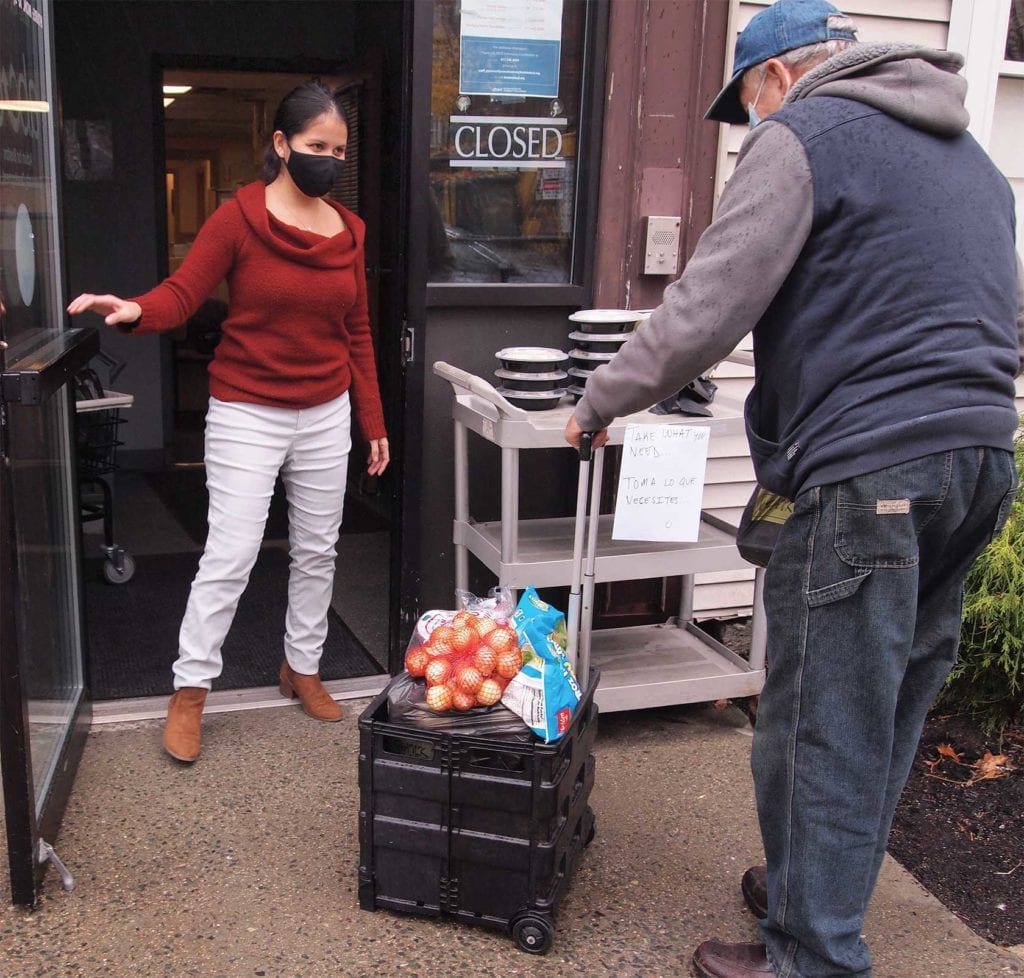Food aid centers face high demand
Increasing number of Bostonians depend on social service agencies

Lines at food pantries and soup kitchens normally grow around this time of year, but the pandemic has doubled them, aid workers say. With an unprecedented amount of need, relief centers are pooling their resources to make sure everyone is fed, though it may not be enough.
ICNA Relief, a Muslim charity in Roxbury, has started a delivery service for its food pantry as the community suffers from COVID-19 and job loss. But with sickness affecting the volunteers and their families, ICNA is stripped of more than one resource. Nomi Palwala, the director of hunger prevention at ICNA Relief, felt the burden of the pandemic increase around the Thanksgiving holiday.
“Our lines have actually doubled,” Palwala said. “They’re standing out there in the freezing cold … It was brutal for me, and I had gloves on. Imagine those who have kids who are not able to leave their kids at home.”
The organization has received assistance through several grants, allowing them to give out $25 vouchers to culturally specific grocery stores that carry Halal items for the holidays. To further meet the demand, ICNA partnered with Fair Foods, a nonprofit that rescues surplus food and redistributes it, which is dealing with its own pandemic-related burdens.
In March, several Fair Foods volunteers and employees, including founder Nancy Jamison, contracted the virus.
“I was sick for about four months. So it was really difficult for us to reopen, but the crew here got it reopened back in May,” Jamison told the Banner.
Now, those who pack the food bags and those who load the trucks stay separate from each other to prevent sickness. Fair Foods’ $2 bag program has been canceled to stop the spread as well, but extending produce to other organizations is one way to fill that gap.
Partnering with the city of Boston’s departments allows Fair Foods to have the capacity to link arms with smaller organizations. Marty Martinez, chief of Health and Human Services, said there is no question that COVID-19 has shed a light on food insecurity in Boston, though the problem here has not yet reached severe crisis levels.
“Gratefully, the lines you see in the news … We haven’t had cars waiting in five-hour lines,” he told the Banner. “We have a really robust system.”
However, Martinez says that the federal government will need to step in to keep up with the demand. His office is also trying to increase awareness of SNAP, as there are thousands of families who qualify but haven’t applied, he said.
The Food Access Office and the Office of Immigration Affairs have helped orchestrate Fair Foods’ distribution, and both the city and Fair Foods are consistently in contact with community health centers and Main Streets organizations to keep track of the needs of each neighborhood.
“All of us are grateful to have the city of Boston’s resilience funding. So many are having a really difficult time, and the grants are our backbone,” Jamison said.
Though she founded Fair Foods over 30 years ago, Jamison said she has never seen a crazier period than the last two weeks. When she returned to work, she found herself exhausted by the increase of produce bags to pack.
“It’s been dramatic, the amount of people that are coming to us. And we’ve reduced ourselves from a 400-a-week crew to about 20 people,” she said.
Another relief center, Action for Boston Community Development (ABCD), added an extra emergency relief day during the holiday week to provide last-minute food, fuel and housing assistance.
The organization partnered with the Greater Boston Food bank and other local food pantries to spread the word on collective resources.
John Drew, CEO of ABCD, is also seeing an unprecedented need at the food pantries. He’s calling on the national government to send more aid as CARES Act funding begins to run out.
“I think the city and the state are getting stretched thin,” Drew says. “The majority of money so far that we got over our regular planning is the CARES money we got from Washington in June,” he said.
For now, ABCD is working as closely as it can with other organizations on the ground to keep the supply chain going without federal help.
Monee Vance, the manager of an ABCD food pantry in Roxbury, is leading a reduced staff into this new phase. While she normally asks those in need to call and make an appointment to pick up food, as they have to pack the bags in advance, people have begun to show up unannounced.
“We’re booked for the whole week,” Vance said. “There’s only so much that I can do in my day to day.” As the phone calls increase, so do requests for other emergency services ABCD cannot provide. “It’s been difficult seeing the community in pain. It makes it more difficult to do my job.”








